(The TL;DR version: I went on a swim camp, it was amazing, highly recommended!)
I leapt off the small boat into the crystal-clear blue ocean, remembering for once to hold my nose so the sea water wouldn’t shoot up my nasal passages. SPLASH! There was no cold shock; the water was 23°C, more than 10° warmer than back home. My inflated pink tow float quickly brought me back to the surface. I felt elated and excited but also a bit nervous, jumping into the sea for a longish swim with an unknown (to me) destination beyond the reef.
Of course, my mind turned to Finding Nemo and Marlin’s anguish when he discovers his son has disobeyed him to swim, one-finned, in deep water. “You’re about to swim in open water! Come back! Neee-moooo!” Poor Nemo was netted by a diving dentist for his office fish tank and I knew that probably wouldn’t be my fate. Still, what unknown adventures awaited beyond the drop-off?
The current was pulling and I clung to the boat ladder while everyone finished jumping in, then we began swimming. Our coach had told us to hum at the beginning of an open water swim because it forces you to exhale gently through your nose underwater, so you expel CO2 and relax. The vibration also calms the vagus nerve, which goes into overdrive when you’re out of your comfort zone. It’s a great tip. We were also paired with a buddy and watched over each other as we practised our techniques, including swimming in sync. This was something I hadn’t done before and it was wonderfully soothing and bonding, a silent rhythm of harmonious strokes as we glided in parallel through the water.
Island time
It didn’t seem real that I was doing a swim camp on the aquatic paradise that is Great Barrier Reef. It had been a fairly spontaneous decision, brought about by an unexpected tax refund a few months earlier. A swim friend was going and there was just one spot left on the Swim Mastery camp, which promised technique lessons and adventure swims. I’d heard about SM through my friend and have found their methods really helpful to relax in the water and swim efficiently. Not only was a sunny getaway appealing, it also felt like an investment in my health to prevent injury from all the swimming I do and an opportunity to swim in a marine park and learn more about the ocean. An overseas swim camp was on my ‘one day…’ bucket list but the tax refund made it a tangible possibility. It was a ‘carpe diem’ decision, the type I am somewhat prone to these days because life feels fragile.
Anyway, I was excited to meet coach Tracey in person after reading her new Swim Mastery book. She worked for many years with American swim guru Terry Laughlin (of Total Immersion, which is all about learning to swim like a fish instead of fighting the water). We started with a session in Swim Mastery’s endless pool (a small pool with a current, like a treadmill for swimmers) in Brisbane with video cameras and screens so I could see myself and realised I was over-rotating when I turn – that discovery alone gave me my money’s worth as it was affecting my arm and leg positions and using up so much energy.
The intended destination for the camp had been Vanuatu, but as their national airline had gone into liquidation in May the location was changed to Heron Island in Queensland, a marine sanctuary on the southern Great Barrier Reef. I learned a little bit about the island during my marine biology course last year because one of the lecturers was a coral reef expert and had spent a lot of time at the island’s research station, which is run by the University of Queensland. The tiny island is a two-hour ferry ride from Gladstone, which in turn is a one-hour flight from Brisbane.
At first, just getting there felt like a challenge – an airline in liquidation, a series of winter illnesses ricocheting around my household, a morning fog delay on the runway at Brisbane Airport which almost caused us to miss the daily ferry, and then a bouncy ferry ride that caused the woman sitting across from me to lose her lunch – and I wondered if I should be taking it all as signs from the universe not to go! But as soon as the little island came into view, its white sands surrounded by sparkling water, everything fell into place.
Not our boat – this is the bow of an old warship placed just off the coast as a breakwave next to the boat channel.
The little resort was peaceful in the off-season and our small group (14 swimmers plus three coaches) also hit it off immediately. Many already knew each other and welcomed the newcomers, including me. Some had been to previous camps, which in itself was a great testimonial. I hadn’t been entirely sure what to expect from a swim trip: a swimming endurance boot camp? Competitive distances? Everyone trying to outperform one another? But it was nothing of the sort – it was a kind, inclusive group of swimmers who were all a joy to swim with. We were there to learn, have fun, and step a little out of our comfort zones together, and that’s what we did.
We followed a daily schedule that usually included a technique session at sunrise (to take advantage of high tide) and a big swim in the afternoon. But there was also time to fit in other activities such as a reef snorkel, a visit to the marine research station, and a ‘reef walk’ at low tide. We spent five nights on the island and each night I slept like a log, tired out and fulfilled from a day spent doing my favourite thing in the world. The coaches were always checking in to make sure that we were okay, that we were achieving everything we came to do, and answering all our swim questions.
Marine life
The island itself is just 17 hectares and a slow walk around its shoreline takes about 30 minutes. At low tide the reef is more exposed and the island (a coral cay, basically a sandbank on the reef) becomes significantly larger. At high tide you can stand on the jetty and watch the rainbow parrotfish, rays, lemonfish (harmless reef sharks) and turtles gliding about. To swim alongside them was even more of a delight.
While times may have changed – a century ago the island had a turtle cannery (a turtle soup factory) and the information centre has a photo on the wall from the 1950s showing people riding turtles – there is plenty still threatening our sealife, and the research centre on the island conducts vital studies of the Reef and climate change.
As a former journalist I was interested in the head marine scientist’s low opinion of the media, for example their lack of distinction between ‘bleaching’ of coral (which in small amounts can be managed/recovered from) and a ‘mass bleaching event’ (very bad, difficult to recover from), highlighting once again the importance of clear, accurate science communication. She told us there had been a mass bleaching event on the reef in February – one of the worst yet – but that there had been partial recovery since temperatures had cooled in the past couple of months. They were hoping for further recovery over the winter. But mass bleaching events are increasing in magnitude and frequency, so the coral has less time to recover before the next one.
On the reef walk. I’m holding a tube for viewing little critters (such as sea cucumbers) through the water.
The starting point for our round-the-island swim.
On our last morning we swam around the island. Rising from bed in the pre-dawn darkness, I felt a bit daunted although we’d been assured we could stop at any time. The sky was pink when we set off in a clockwise direction, with a couple of kayaks guiding us. Within minutes a turtle swam in front of me with an elegant breaststroke, taking its time. I swam over rays, through schools of fish, over golden sand and bits of coral. Sometimes the current was tiring, but no way was I going to stop; I wanted every precious moment in this water before it was time to leave. After an hour or so the jetty came back into sight, the sign we’d completed our circle, and before I knew it we were done. The morning coffee and buffet (I may have had a few plates’ worth of cooked breakfast) tasted excellent.
Our ferry ride back to the mainland was as smooth as glass, with no lost breakfasts. Then, in a manner that felt somewhat predictable by now, our return flight was delayed – this time, by bats on the runway! I was delighted (not everyone shared my feelings). Nature came first.
(Photos taken by me and others from the Swim Mastery Heron Island retreat.)




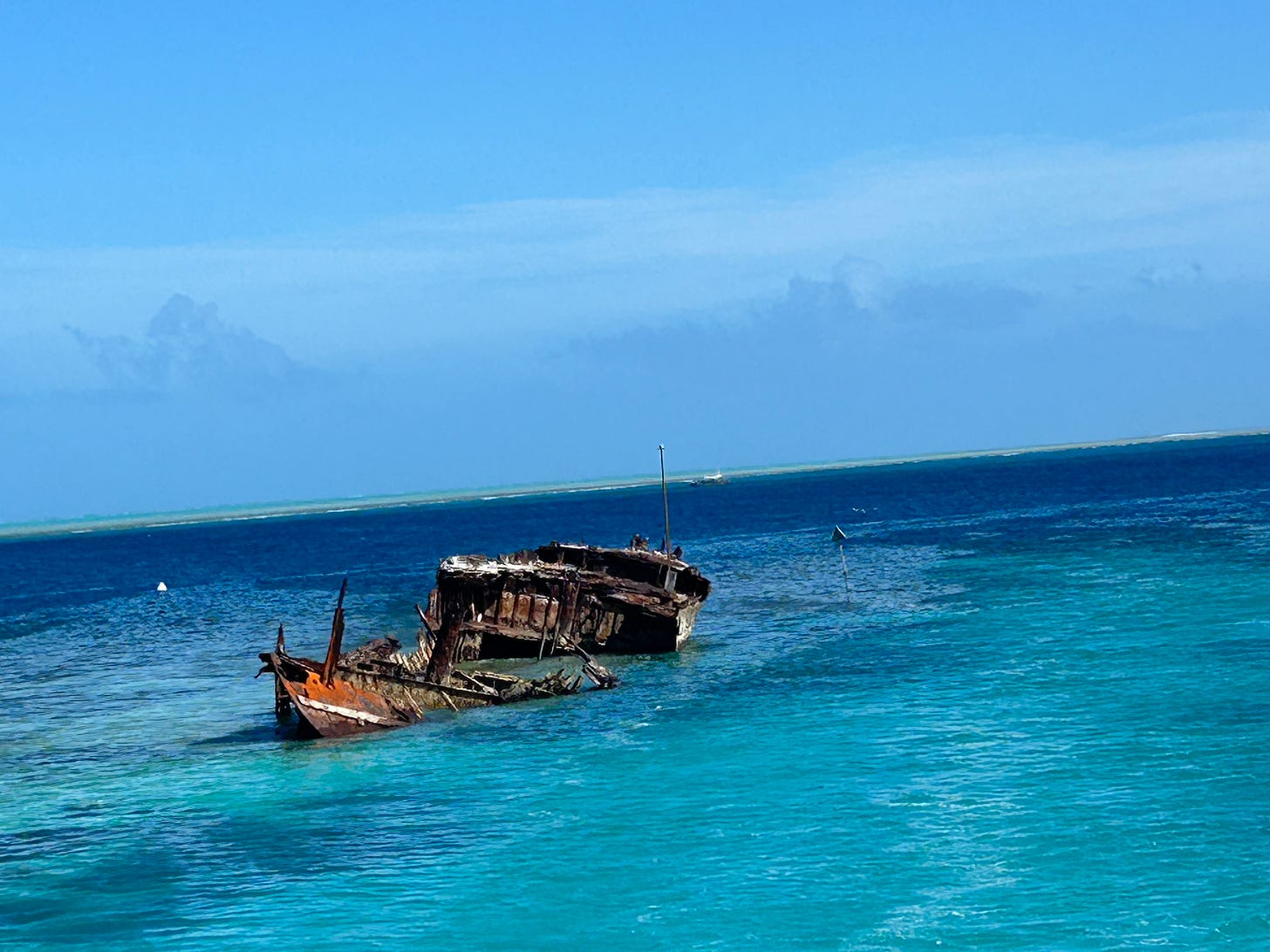
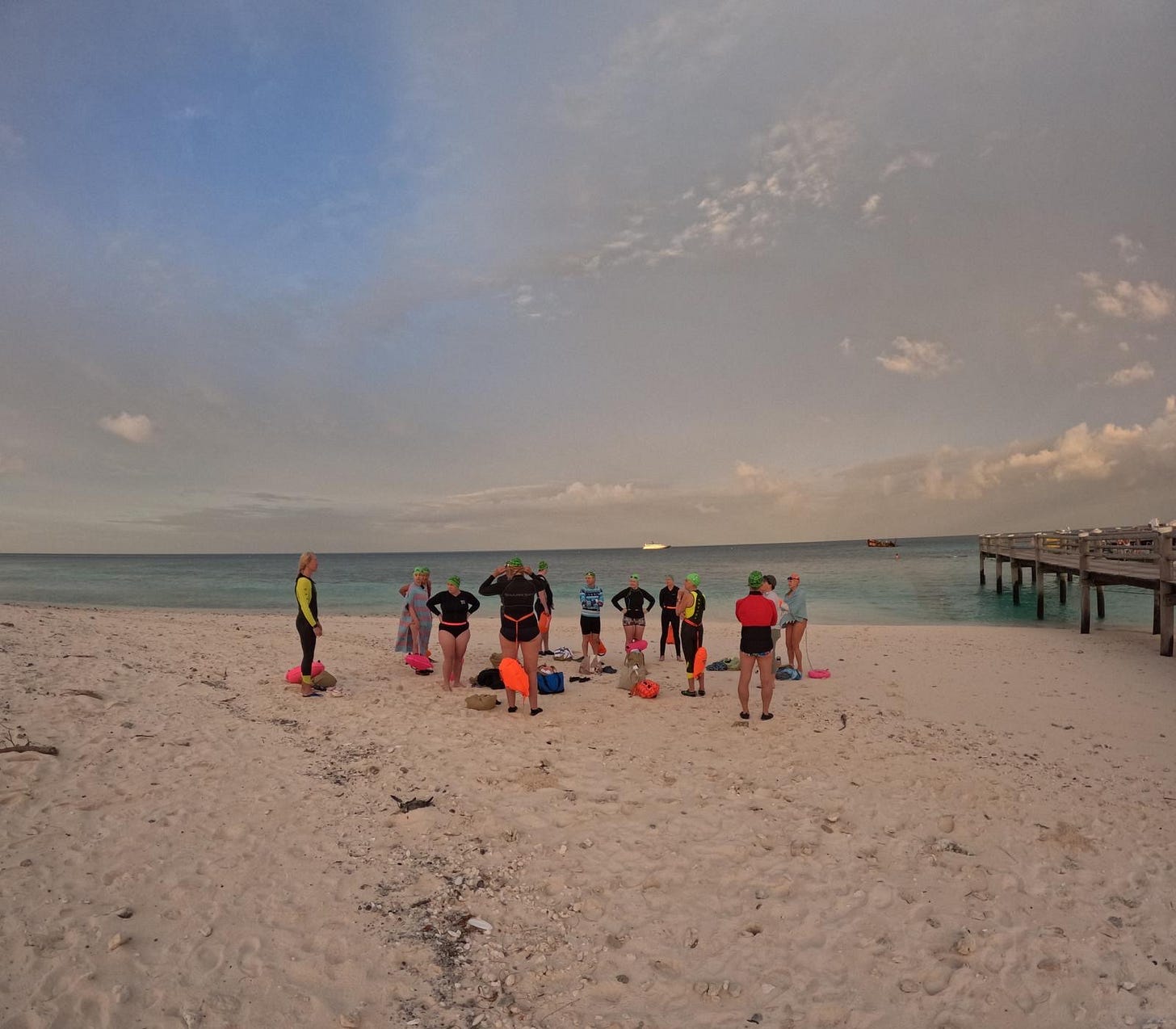

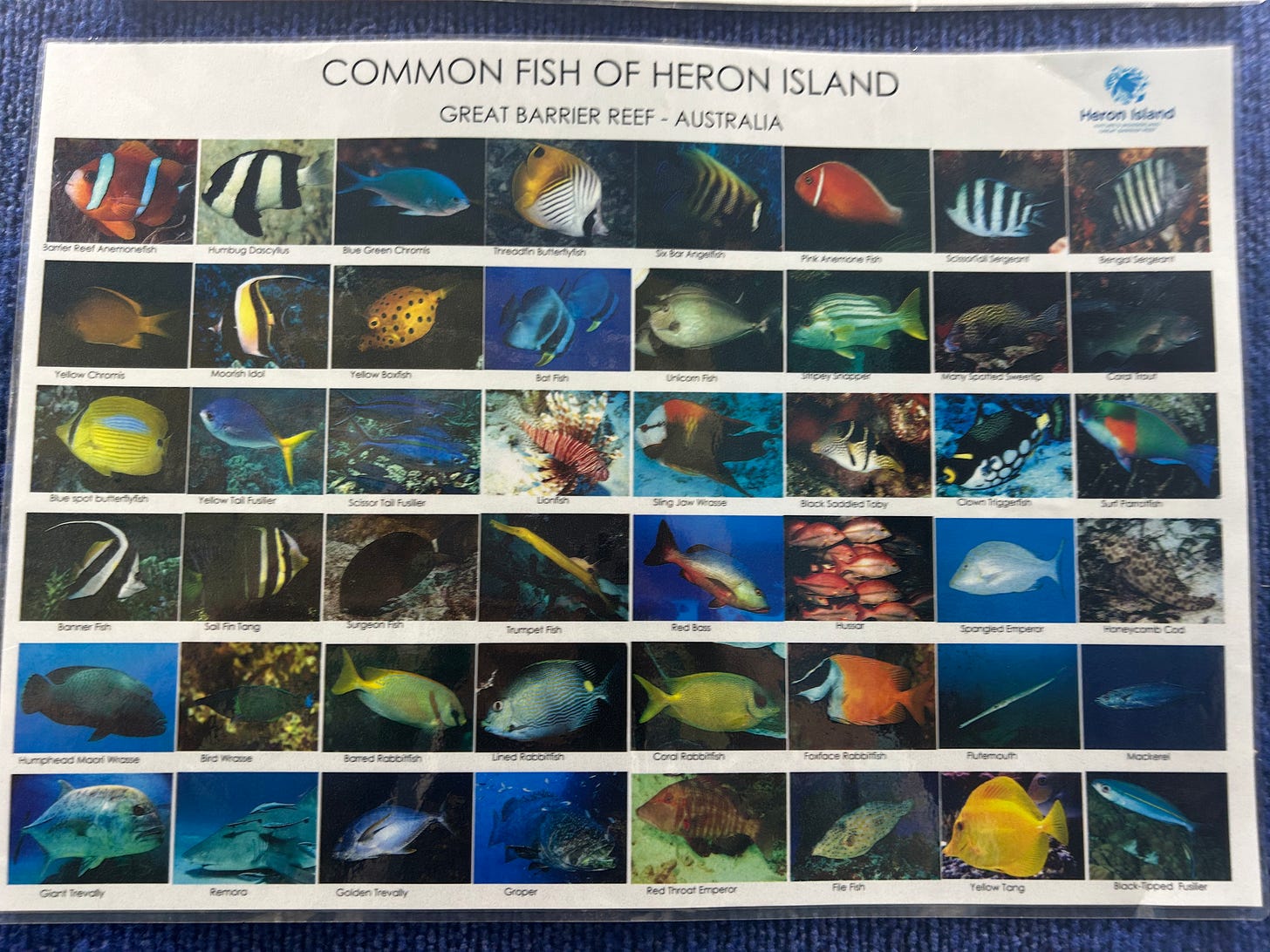
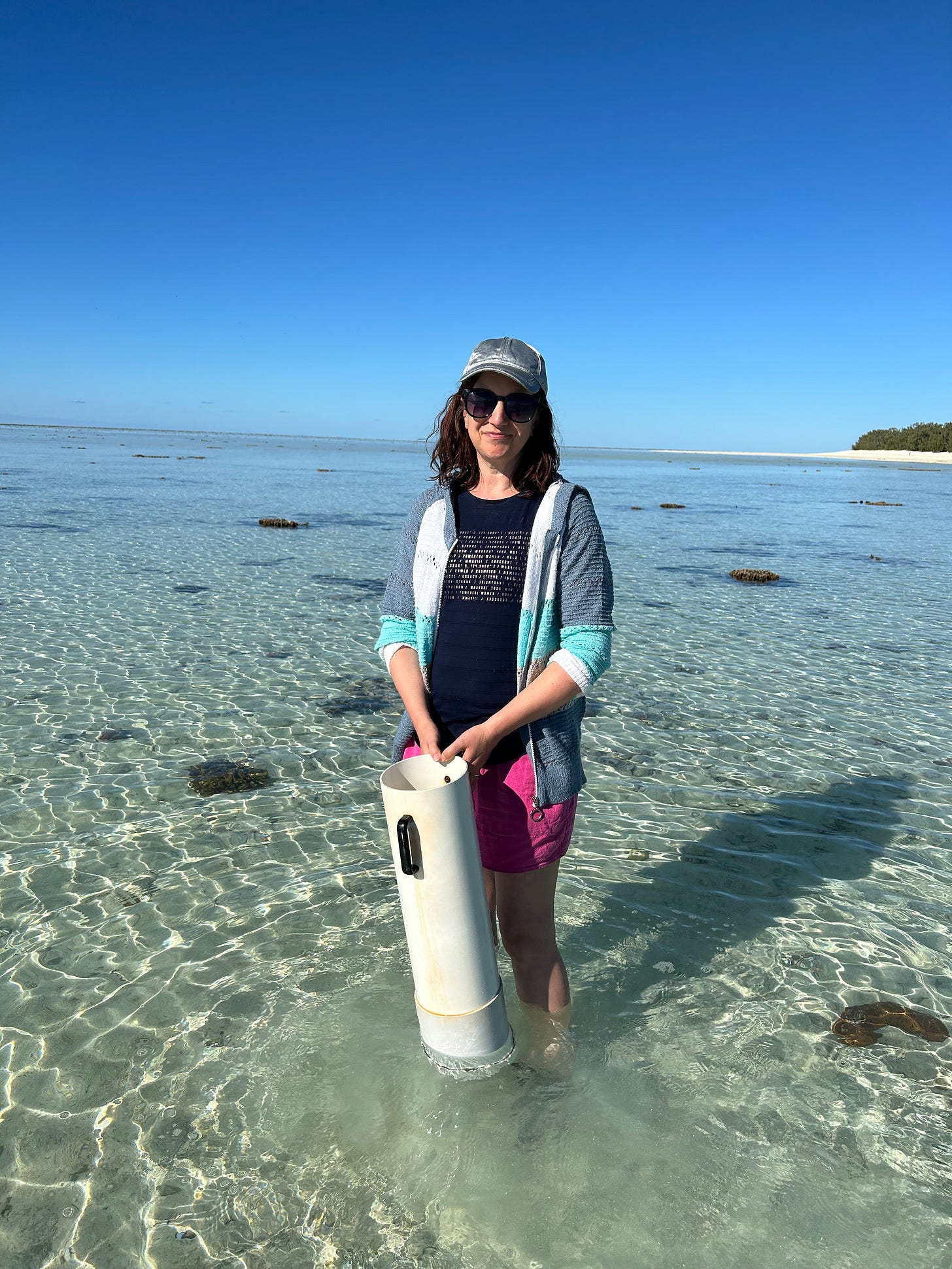
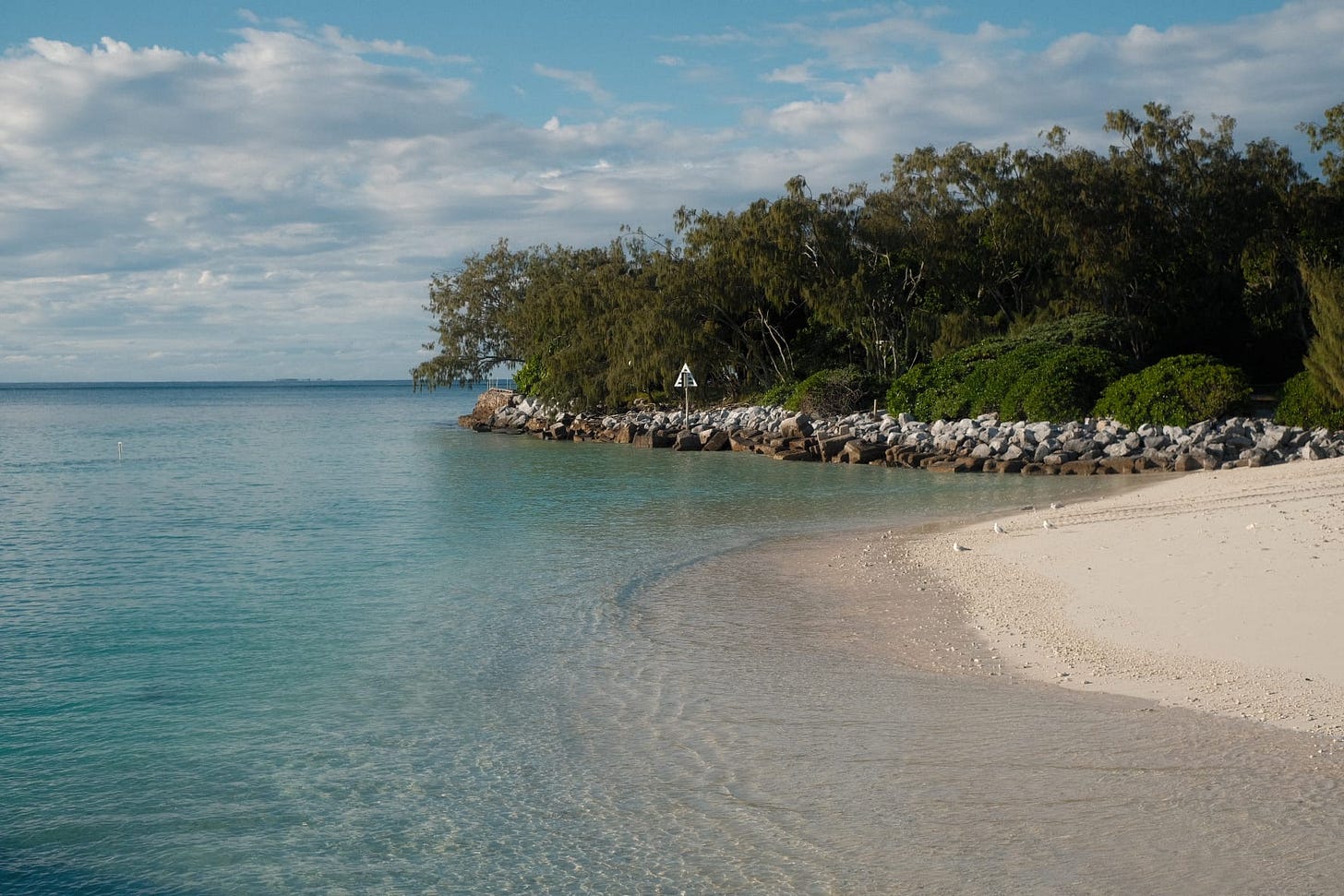

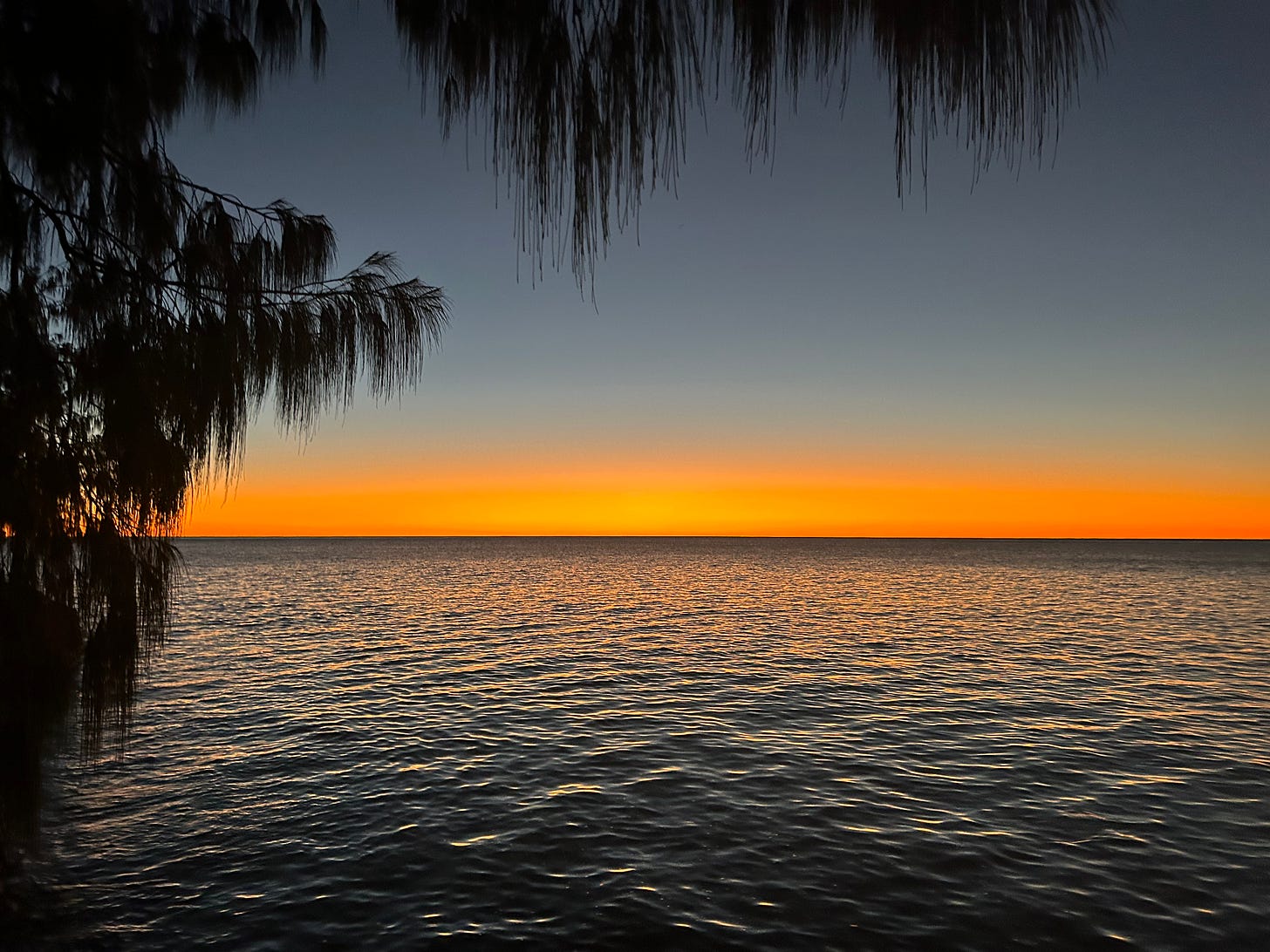
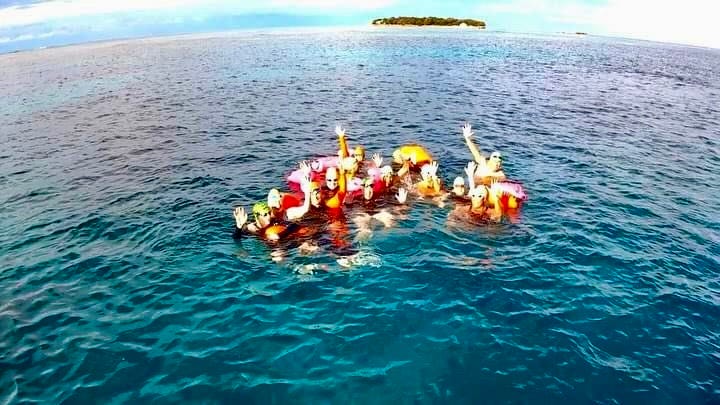
Amazing. It sounds just awesome. Turtle soup 😱. It’s a reminder we can change things. Looking forward to hearing what’s next.
As i recuperate from rather major surgery, I'm just envious. On so many levels.